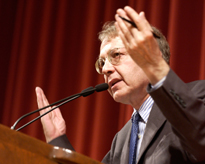Award-winning author Jonathan Kozol has more than 40 years of experience in public education behind his belt.
In all that time, he said he has learned a disturbing truth: America’s public schools still remain separate and unequal.
The College of Arts and Sciences hosted Kozol in a public lecture Wednesday titled “Still Separate and Unequal: The Struggle for Urban Schools” at the Louis J. Roussel Performance Hall.
Kozol has earned praise for his portrayal of the ills of public education in the U.S., from schools that cannot provide students with the most basic textbooks to schools that must endure raw sewage flowing into classrooms.
Kozol’s work in “Savage Inequalities,” a gripping depiction of the disparity among children in America’s schools, was the focus of the lecture.
“Savage Inequalities” was awarded The New England Book Award in nonfiction and was runner-up for the 1992 National Book Critics Circle Award.
It was also the subject of a PBS Special entitled, “Children in America’s Schools, with Bill Moyers.”
“Nothing could be more important than the pressing issues of education equality,” the Rev. Kevin Wildes, S.J, university president, said as he introduced Kozol to a packed auditorium.
“This is a topic very rarely discussed,” University Programming Board President Cindy Hurley said. “I think it brings a lot of awareness and diversity to all the issues that surround the campus.”
UPB is one of 15 organizations and school departments that were asked by the College of Arts and Sciences to co-sponsor the lecture.
“It’s something overlooked, something very part of New Orleans,” marketing junior Hurley said. “This is a great way to educate students.”
Kozol admitted to his audience that he never intended to become a teacher, but one single act in the summer of 1964 changed his life. He had planned to return to Harvard that summer, when three men were kidnapped and later found dead in Mississippi. Those men were preparing to establish a school in rural Mississippi, before being murdered by members of the Ku Klux Klan.
“It had a stunning effect on me,” Kozol said.
Determined to do something about the matter, 26-year-old Kozol set out to become a teacher in Roxbury, Mass., an area largely populated by African Americans.
Kozol felt compelled to write “Savage Inequalities” after visiting rich and poor schools in more than 30 communities.
Kozol came to the realization that after four decades of struggle for equality, America’s public schools still remain separate and unequal.
According to Kozol, one of the main issues regarding urban schools is the constant effort by the teachers to focus on state examinations. These exams are forced on children, most of whom have had no previous education.
“It is outrageous to impose tests so early on if we deny them preschool education,” Kozol said.
These children, whom Kozol refered to as “examination soldiers,” go through their entire education preparing for standardized tests.
“We train people to obey orders. We educate people to ask questions,” Kozol said.
Kozol made adamant that the point of his story is not to find a solution but to make aware the ills of inequality among public education systems.
“Life is tough for children in the New York City neighborhood I write about,” Kozol said.
“In New York City, where do you put a big toxic industry that smells, often burns trash and medical waste? You don’t put it next to Donald Trump’s apartment because he has political power…you put it in a poor black neighborhood where children’s lives don’t count.”
Kozol made constant referrals to the Rev. Martin Luther King Jr., who one of the schools mentioned in his book is named after.
“I’m old enough to remember the dream that so many fought for,” Kozol said. “Today fewer black children are in attendance in integrated schools since the year Martin Luther King Jr. died. They talk about the dream but nobody wants to say what it is. We all like to believe we deserve to win by thinking the game is fair, but the game is rigid from the starting point.”
Michael Nissman can be reached at [email protected].







